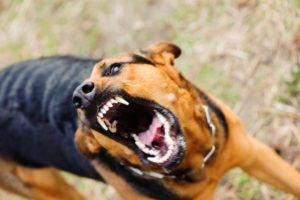Rhode Island dog bite lawyer, David Slepkow discusses important questions about dog bite law in Rhode Island and Providence Plantations. Rhode Island follows the ‘one free bite’ law for dog bites within a dog’s enclosure. If a dog is within an enclosure the victim must establish a dog owner’s knowledge of a dog’s dangerous propensities.
Rhode Island dog bite lawyer

When a dog causes an injury outside of its enclosure then RI does not follow the ‘one free bite law.’ If a dog injures someone outside of an enclosure Rhode island law imposes strict liability. ( Dog owner knowledge of a dog’s dangerous propensities need not be proved when a dog bites a person outside of an enclosure.)
These dog and animal liability causes of action are complicated matters. An injured victim should retain a Rhode Island dog bite lawyer or a Providence dog bite attorney. A Providence personal injury lawyer will help the dog attack victim get top compensation for their injuries. Many victims are wondering about,”ri vicious dog law” and “rhode island dangerous dog.”
Propensity to bite
If a dog bites an injured victim outside an enclosure in RI then there is strict liability and no prior dog bite needs to be proved by a victim to be entitled to compensation. The Rhode Island Supreme Court stated “Strict liability attaches for any injury occurring outside the dog’s enclosure.” “Therefore, the dog-bite statute imposes strict liability in any circumstance wherein the dog is outside of its owner’s enclosure.” Johnston v. Poulin, 844 A.2d 707 (Rhode Isl. Sup. Ct., 2004).
Strict liability
Strict liability means that the dog bite or dog attack victim is not required to show that the dog’s owner acted negligently and is at fault for the dog mauling, dog aggression or dog attack. In other words, the injured victim need not show that the owner knew or should have known that the dog had bitten someone before. When there is strict liability negligence, fault or notice is not required.
What is an enclosure?
The Rhode Island Supreme Court sitting in the Capital City of Providence, “has interpreted the term “enclosure” to mean “a fence, physical obstruction or any other condition that gives reasonable notice to third parties that the area is private.” Montiero, 813 A.2d at 981; see also Butti v. Rossi,617 A.2d 881, 882 (R.I.1992). The Rhode Island Supreme court is the highest tribunal in the Ocean State and hears matters of attorney discipline as well as direct appeals and writs of certiorari.
Is a dog bite even required when a dog causes an injury outside of the dog’s enclosure?
NO. Pursuant to RI law 4-13-16 dog aggression, a dog bite, dog hostility or a dog assault is NOT required for dog owner liability when a dog injures someone outside of an enclosure! All that is required is that the dog “otherwise injures” a person out of an enclosure! “…the Legislature enacted a statute, now embodied in G.L.1956 § 4-13-16, that imposes strict liability in circumstances in which “any dog kills, wounds, worries, * * * assaults, bites, or otherwise injures any person while traveling the highway or out of the enclosure of the owner or keeper of that dog * * *.” (Emphasis added.) See Johnston v. Poulin, 844 A.2d 707, 713 (R.I. 2004); Ferrara, 823 A.2d at 1137; Montiero, 813 A.2d at 981; Kelly v. Alderson, 19 R.I. 544, 544-45, 37 A. 12, 12 (1896).
Must a victim show a dog’s propensity towards violence to win dog bite case?
If a dog causes injury or bites inside an enclosure then Rhode Island utilizes the ‘every dog gets one free bite rule.’ This means that an injured dog bite victim must prove that the dog owner knew the dog was dangerous. This means that some level of “scienter” on the part of the dog’s owner must be established in a court of law. This is commonly known as the every dog gets one free bite law. This means that the dog owner must have known about a prior dog bite or previous dangerous or violent actions by the dog. “Under the common law a person could recover damages from a dog bite only if that person could prove that the owner was aware of the dog’s dangerous propensities * * *.” Ferrara v. Marra, 823 A.2d 1134, 1137 (R.I.2003).
The Top Court in RI determined, “If injuries are suffered within an owner’s enclosed area, the strict-liability statute does not apply, but rather the common law continues to apply and dictates that the plaintiff first must prove that the defendant knew about the dog’s vicious propensities, a scienter requirement commonly referred to as the “one-bite rule.” See Montiero, 813 A.2d at 981. Barry E. DuBOIS et al. v Frederick QUILITZSCH et al, 21 A.3d 375 (2011).
Aggressive dogs are a common problem
Aggressive dogs are a common problem in many communities in Rhode Island and Providence Plantations, where individuals suffer serious injuries from dog bites and attacks. Many of these incidences are the result of training the animal to be aggressive, a development of bad behaviors, instinctual aggression or a lack of proper supervision. Whether the owner is present during the attack or not, they have a legal responsibility to maintain control over the dog to ensure the safety and well-being of humans and other pets.
4.5 million individuals in the US sustain serious dog bites
The Centers for Disease Control and Prevention (CDC) estimates that more than 4.5 million individuals in the US sustain serious dog bites each year. This includes the approximate 800,000 individuals that require medical attention of which more than 350,000 need emergency treatment. A high majority of those injured by serious dog bites are children.
Size, strength and aggressiveness of the dog
The size, strength and aggressiveness of the dog is often a factor in the severity of the injuries. Personal injury attorneys in Rhode Island and RI dog attak attorneys who specialize in dog bite cases file claims and lawsuits against canine owners and handlers for various damages that include:
• Severe injury to facial nerves
• Severed fingers
• Damage to body organs caused by teeth penetration
• Life-threatening infection
• Emotional trauma
• Wrongful death
Dangerous Dog Breeds in RI
Many communities throughout the United States have enacted dangerous dog laws as a way to protect citizens and provide them the legal right to seek financial compensation when attacked or bitten by a dog. Dangerous dogs are considered breeds known to attack humans that follow specific behaviors that inflict serious injuries on human beings, especially children, without provocation. Some laws also protect other domestic animals from dangerous dog breeds that attack, kill or inflict serious injuries on victimized pets.
Data maintained by the Insurance Information Institute indicates that the most dangerous dog breeds in the United States include:
• Pit Bull
• Akita
• Rottweiler
• Alaskan Malamute
• Doberman Pinscher
• Husky mixes
• Siberian Husky
• Chow Chow
• German Shepherd
• Great Dane
• Staffordshire Bull Terrier
• Saint Bernard
• Presa Canario
Dog Bite Liability In Providence
When it individual is attacked or bitten by a dog, liability is often attributed to its owner, trainer, sitter or handler who might have been in control of the dog off a leash or those who provided inadequate fencing. In some cases, the dog was allowed to run free, was poorly trained or had a natural tendency to attack specific individuals, especially children or any person attempting to pet it.
Determining Liability in Rhode Island Courts
If you have suffered soft tissue injuries caused by an animal attack or dog bite, you are likely facing life altering, severe medical problems. Damages often range from fractured bones to deformities and significant scars. In many cases, the victim requires extensive plastic surgery that often does not repair the damage caused by the dog bite completely.
Successful personal injury attorneys in Rhode Island who specialize in dog bite cases will file a claim on behalf of their clients under the dog owner’s homeowners insurance policy. The lawyer must prove how the dog’s owner, handler, trainer or sitter was negligent in their actions or inaction to provide safety to others. In the case of a dog outside of its enclosure there is strict liability in RI. In some cases, additional third part can also be held legally liable for the attack, such as a landlord or apartment management company that provided inadequate fencing which led to the dog attack or bite.
Prove liability
Under the theory of negligence, the RI injury attorney will identify all underlying circumstances leading to the attack with injuries, and show the evidence to the claims adjuster or jury at trial to prove liability. Building a case requires gathering evidence, reviewing medical records, photographing injuries, speaking to eyewitnesses and hiring expert professional witnesses to provide testimony at trial. Animal attack cases are typically accepted by East Providence personal injury attorneys or Rhode Island dog bite lawyers on a contingency basis. This provides you the opportunity to receive immediate legal representation without the need to pay upfront fees or provide a retainer.
Dog Bites Rhode Island
For a nice rundown of states that have adopted the one free bite law, please see dog bite law
- “34 U.S. dog bite-related fatalities occurred in 2015. Despite being regulated in Military Housing areas and over 700 U.S. cities, pit bulls contributed to 82% (28) of these deaths. Pit bulls make up about 6.6% of the total U.S. dog population.2
- Together, pit bulls (28) and rottweilers (3), the second most lethal dog breed, accounted for 91% of the total recorded deaths in 2015. This same combination also accounted for 76% of all fatal attacks during the 11-year period of 2005 to 2015.
- The breakdown between these two breeds is substantial over this 11-year period. From 2005 to 2015, pit bulls killed 232 Americans, about one citizen every 17 days, versus rottweilers, which killed 41, about one citizen every 98 days.” Dog Bite
The most dangerous canine breeds are Pit bull, Rottweiler, Husky and German shepherd
Legal Notice per Rules of Professional Responsibility: The Rhode Island Supreme Court licenses all lawyers and attorneys in the general practice of law, but does not license or certify any lawyer / attorney as an expert or specialist in any field of practice. While this firm maintains joint responsibility, most cases of this type are referred to other attorneys for principle responsibility.

